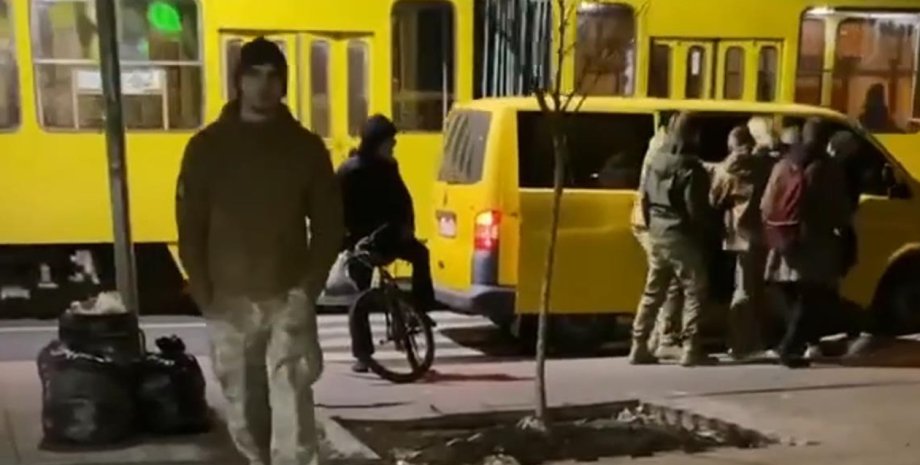The Dictionary of Modern Ukrainian Language and Slang “Myslovo” announced the word of the year 2024, and it was the term “busification”. This neologism, which denotes forced mobilization under an accelerated procedure, reflects public sentiment and key events that influenced Ukrainians over the past year, writes WomanEL.
ContentWhat does “busification” mean?Why “busification” became the word of the yearOther candidate wordsPrevious words of the yearWhy it is important to record new words 
What does “busification” mean?
The term “busification” comes from the word “bus” (a minibus, often in the context of vehicles for mobilization) and the Latin suffix “-fication”, meaning process or transformation. It describes the phenomenon when mobilization processes are carried out in a hurry and often without taking into account individual circumstances and human rights.
The editorial staff of “Myslovo” notes that this term has become a reflection of problems in the field of mobilization, where the emphasis is on quantity rather than quality, which causes discussions in society.
Why “busification” became the word of the year
The word became popular because of:
- Public attention to mobilization. Accelerated mobilization measures affected many people, becoming a subject of discussion and criticism.
- Symbolism. The word is a kind of marker of the complex realities of wartime, when the logic of war sometimes supplants human rights.
- Neologisms as a trend. The Ukrainian language is actively replenished with new words that capture modern realities.

Other candidate words
Among the candidates that could become the word of the year were various terms that reflect key events and phenomena in Ukraine in 2024. The competition for “busification” was:
Quadrobers— a term describing representatives of a children's subculture who imitate animal behavior using movements on four limbs (quadro). In 2024, this trend became a noticeable cultural phenomenon in Ukraine, attracting attention as an unusual social phenomenon.
Fatigue — a word that has become a symbol of the moral and physical exhaustion of society due to the war of attrition waged by Russia. “Fatigue” reflects the emotional state of many Ukrainians who are trying to find the strength for further resistance.
SZCh(unauthorized abandonment of a unit) – the abbreviation means a soldier's voluntary abandonment of his unit without the permission of the command. In 2024, the phenomenon began to become widespread due to problems in the organization of military service, caused by both “busification” and the moral and psychological state of soldiers.
MSEC (medical and social expert commission) — the word became famous due to scandals related to corruption in the field of medical and social expertise. In 2024, there was a resonance in cases where people received illegal dismissals from service due to corrupt schemes.
Kursk operation — a successful military operation that became a symbol of Ukraine's victories.
Magura is a naval drone that changed the balance of power in the Black Sea and became an effective tool in the fight against the enemy fleet.
Populism— the term became relevant due to the promises of politicians, such as the National Cashback and “Zelensky’s Thousand” programs. Populism in 2024 was associated with election campaigns and the desire to gain voter support through loud promises.
Negotiations– this term became popular due to the growing desire in society to achieve a truce or freeze the conflict due to the duration of the war and the depletion of resources. In 2024, discussions about negotiations occupied an important place in the media space.
Lalochesia is a word that describes the use of swear words to relieve pain or stress. In 2024, this word illustrated the normalization of the use of profanity as a reaction to the constant stress of war.
Previous words of the year
The Myslovo dictionary annually determines the word that most reflects social sentiments and realities. In previous years, the winners were:
• 2023: mobilization.
• 2022: Russian warship, go to hell.
• 2021: vaccine.
• 2020: coronavirus.
• 2019: digitalization.
• 2018: tomos;
• 2017: visa-free;
• 2016: corruption;
• 2015: blockade;
• 2014: cyborgs;
• 2013: Euromaidan.
Why is it important to record new words
The Ukrainian language is constantly changing, reflecting the realities and experiences of society. The Word of the Year is not only a linguistic phenomenon, but also a social indicator that helps to understand the main challenges and events. “Busification” became a reminder of the complexity of wartime, calling for discussion of important topics related to human rights, mobilization organization, and social justice.
The word of the year 2024 was also announced, which gained incredible popularity among users from all over the world, and was chosen by the Cambridge Dictionary.

